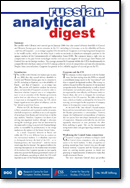Higher Education Reforms and Global Geopolitics

Shifting Cores and Peripheries in Russia, the Baltics, and Central Asia
Author(s): Iveta Silova
Editor(s): Stephen Aris, Matthias Neumann, Robert Orttung, Jeronim Perovic, Heiko Pleines, Hans-Henning Schröder, Aglaya Snetkov
Series: Russian Analytical Digest (RAD)
Issue: 97
Pages: 9-12
Publisher(s): Center for Security Studies (CSS), ETH Zurich; Research Centre for East European Studies, University of Bremen; Institute of History, University of Basel
Publication Year: 2011
